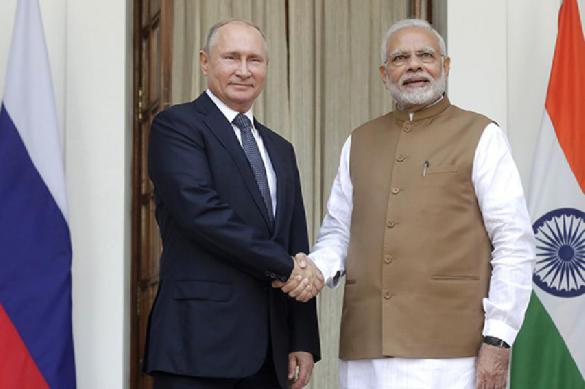US fails to force India to 'divorce' Russia
It is pleasure to watch Russian President Putin and Defence Minister Sergei Shoygu conducting successful talks in India, knowing that Washington will be extremely displeased with their results.

Vladimir Putin arrived in India on Monday, December 6, for talks with Prime Minister Nareandra Modi. Russian Foreign Minister Sergei Lavrov, Defence Minister Sergei Shoygu and the head of Rosneft Igor Sechin arrived in India earlier than Putin.
In its efforts to counter China, Washington established a "security dialogue" in the region with India, Japan and Australia (QUAD). US officials must be mad to watch India acting as an independent country, rather than a US vassal.
Yuri Ushakov, the Kremlin's foreign policy adviser told reporters last week that Russia and India would sign ten agreements, including in the energy sphere.
According to The Hindustan Times, contracts will be signed for the supply of S-400 air defense systems in the amount of $5.4 billion. In addition, a contract has already been signed for the construction of a plant for the production of Kalashnikov AK-203 assault rifles in Ameti, the state of Uttar Pradesh.
- It is expected that the Indian army will acquire 7,500 AK-203 rifles. The contract provides for the full transfer of technology within seven years after the signing of the contract.
- The parties will also discuss a deal on the sale of the Igla air defense system to India, but it is unlikely that it will be signed during this visit.
- The key agreement that Russia and India may sign is called the Reciprocal Exchange of Logistics Agreement (RELOS), which will allow the military of the two countries to gain access to logistics and support facilities at their bases.
India believes that the above-mentioned military ties with Russia will not fall under the sanctions of the US CAATSA act as India seeks to expand ties with the United States to counter China.
India to take part in projects in the Far East and the Arctic
The Financial Express suggests that Putin will discuss energy supplies to India from Russia after it came under secondary US sanctions against Iran, with which it had concluded extensive oil supply contracts.
France has recently warned its banks not to finance the Arctic LNG 2 project, but India is ready to invest in the project.
The Economic Times reports that India has ambitious plans for the Russian Far East offering a billion-dollar credit line for various projects in the region.
"All eyes are on revival of Vladivostok-Chennai maritime connect," ET said.
India's investment in Russia's oil and gas projects exceeds $15 billion. This is the largest area of Indian foreign investment in the oil and gas sector, and the Indian government plans to increase them. Russia makes its investment in India as well. In August 2017, Rosneft bought 49 percent of Indian company Essar Oil Limited (Nayara Enegry).
India also evinces interest in the Northern Sea Route through the Arctic, as well as in Arctic rich mineral deposits, such as iron ore.
An old friend is dearer than new ones
The history of cooperation between Russia and India goes back to Soviet times, when Leonid Brezhnev supported India financially and morally in its war with Pakistan. The 1971 Soviet-Indian Friendship Treaty evolved into the 2000 Strategic Partnership Agreement.
India has cut its purchases of Russian arms by 33 percent during the recent years, but India's fleet of aircraft, tanks, and artillery implies close cooperation with Russian technical services and envisages purchases of various equipment and spare parts. For decades, Russia has been India's reliable partner that was ready to transfer technologies — India had difficulty getting such a perk from other partners.
It goes about not only military programs, such as the Brahmos fighter jet, but also nuclear reactors and space programs.
India remains grateful to Russia, and it would be reckless to assume that India would "divorce" Russia to please the United States.
Moscow has distanced itself from the conflict between India and China over the border issue and has been urging other countries to unite within the scope of the Shanghai Cooperation Organisation (SCO) and BRICS. It is significant that China and India find a common language within these organizations.
Subscribe to Pravda.Ru Telegram channel, Facebook, RSS!


